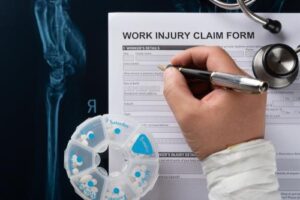Notice: Thank you for visiting our informational page regarding Eliquis Internal Bleeding claims. At this time we are no longer accepting cases regarding Eliquis Internal Bleeding cases. However, if you feel that you have any questions about other defective medical devices, dangerous drugs, recalls, or any additional legal concerns that we may help you with, please call us or fill out the evaluation form.
The drug Eliquis is prescribed to prevent strokes and blood clots such as deep vein thrombosis. The patients given this drug are told that it will block the formation of blood clots and that it could save their lives. But these patients often don’t realize a crucial truth: Eliquis may put them at risk for life-threatening internal bleeding, and there is no antidote.
If you or someone you love have taken Eliquis and experienced internal bleeding, we can help you. The attorneys of John Foy & Associates are currently exploring Eliquis internal bleeding lawsuits. We believe that patients have been unfairly subjected to an irreversible, life-threatening event. John Foy & Associates is one of the most experienced medical injury law firm in Georgia. We want to help you receive a financial settlement that could pay for your medical bills, ongoing treatment and more.
There is no way to reverse a grave medical mistake. But it is possible to recover financially. Call us at 404-400-4000 and get a free consultation today.
What Is Eliquis and Why Is It So Dangerous?
Eliquis is the brand name of the drug apixaban, which was created in a joint venture by Bristol-Myers Squibb and Pfizer. It is a “blood thinner” or anti-coagulant, a medicine that prevents the blood from clotting. Normally, clotting is a healthy response to a cut or injury and helps stop blood loss. But when clotting happens internally, it can lead to serious conditions such as:
- Deep vein thrombosis, where the clot gets lodges in a deep vein (usually in the legs) and blocks blood flow
- Pulmonary embolism, where a clot travels to the lungs and can be fatal
- Stroke, which can be caused by a clot blocking blood flow to the brain
Eliquis and other anticoagulants make it virtually impossible for clots to form. This can be life saving. But in a bleeding event it can be deadly. Since the blood won’t clot, the bleeding may continue unabated for hours or even nonstop. This can cause serious injury and even death.
All bleeding is risky on blood thinners. But internal bleeding is especially damaging. This is because it involves blood flow to internal organs, and also because you may not be aware that you are bleeding internally until it has become extremely serious.
Get the strong arm
What Causes Internal Bleeding?
Internal bleeding is usually caused by external trauma. For example, if you’re in a car crash your body will be thrown forward and come to an abrupt stop. The organs inside your body are also thrown forward, “slamming” into the surrounding tissue. This can be enough to cause bleeding from one or more organs, even if the skin is not broken. Blood vessels themselves may also bleed internally from this kind of impact. You may not even know you’re bleeding.
Internal bleeding can occur in other ways as well. Mothers giving birth may experience internal bleeding. Wounds can cause internal and external bleeding. And surgery itself can sometimes cause unintentional internal bleeding, which is particularly dangerous since Eliquis is prescribed as a post-surgery drug.
In particular, we are concerned about patients on Eliquis who experience:
- Cerebral hemorrhages
- Gastrointestinal bleeding
- Kidney bleeding
- Rectal bleeding
These conditions can be fatal, especially on blood thinners.
What Makes Eliquis Different from Other Blood Thinners?
The risks of blood thinners are well established. But Eliquis is part of a new class of blood thinners that do not have reversal agents. A reversal agent is like an antidote—a way to turn the drug “off” if internal bleeding is discovered.
Past anti-coagulants do have reversal agents. Warfarin, a previous generation drug from a different class of blood thinners, can be reversed with the simple remedy of Vitamin K. If a patient has a bleeding event, the Vitamin K can be administered and their blood will clot normally.
For Eliquis patients this is not an option.
Are Pfizer and Bristol-Myers Squibb liable for the Harm Caused By Eliquis?
Yes. Sending a drug to market with life-threatening side effects, and no way to fight those side effects, is reckless. The FDA approved the drug because it believed that it will save more lives than it endangers. But for those who experience a serious health incident, or lose a loved one, that math is no comfort. Pfizer and Bristol-Myers Squibb knew the dangers when they began marketing the drug.
Patients affected by Eliquis have a right to a recovery. There is no way for the law to restore lost health or reverse a medical incident. However, the law can make sure that the responsible party pays and that the victim is not left with staggering medical costs. You may be able to recover the costs of your initial treatment, emergency room visit, ongoing care or therapy, and lost work time, as well as other costs.
There is already precedent for this kind of lawsuit. A similar drug from the same class of blood thinners, Pradaxa, has already been sued over internal bleeding claims. Recently, the manufacturer settled the case and is paying a total of $650 million to the victims. Every lawsuit is unique, and the results of one case don’t guarantee the results of another—but this is a very promising sign for individuals and families who have been harmed by Eliquis.
What Should I Do If I Was Harmed By Eliquis?
If you, or someone you love was harmed by internal bleeding while taking Eliquis, you need to speak to an attorney right away. Medical cases have tight deadlines and if you wait too long you may not be able to get a recovery at all.
John Foy & Associates is ready to help. We would like to sit down with you for a free, in-depth case consultation. This consultation is your chance to find out if you have a legal basis for a recovery. There is no risk—we charge nothing up front and nothing if we don’t get you money.
Don’t let the medical bills pile up. Call us at 404-400-4000 and get your FREE consultation today.
404-400-4000 or complete a Free Case Evaluation form





